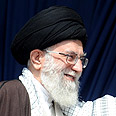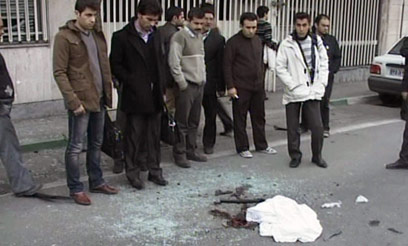
A senior UN nuclear agency team will visit Tehran on Jan. 28 with Iran saying it is ready to discuss allegations that it was involved in secret nuclear weapons work after years of refusing to do so, diplomats said Thursday.
Diplomats have previously said that International Atomic Energy Agency officials were discussing such a trip with their Iranian counterparts. But before the diplomats' comments Thursday, no date - or indication that Iran was ready to talk about the allegations - had been mentioned.
Related articles:
- Obama, Netanyahu discuss developments in Iran
- 'Covert war on Iran – prudent strategy'
- Op-ed: Killing the brains
- Nuke expert: Time to attack Iran
- Nuke expert: Time to attack Iran
Any follow-through on the part of Iran on its reported pledge to discuss nuclear arms suspicions would be significant.
For more than three years, Tehran has blocked IAEA attempts to follow up on US and other intelligence alleging covert Iranian work on nuclear arms, dismissing the charges as baseless and insisting all its nuclear activities were peaceful and under IAEA purview.
Faced with Iranian stonewalling, the IAEA summarized its body of information in November, in a 13-page document drawing on 1,000 pages of intelligence. It stated then for the first time that some of the alleged experiments can have no other purpose than developing nuclear weapons.
Iran continues to deny the charges and no change in its position is expected during the Tehran talks with IAEA officials. But even a decision to enter a discussion over the allegations would be a major departure from outright refusal to talk about them - and create hopes of future progress in the investigation.
Two diplomats told The Associated Press that Iranian officials had suggested they were ready to talk about the issue during recent meetings with officials of the Vienna-based IAEA. They asked for anonymity because their information was confidential.
Ali Asghar Soltanieh, Iran's chief IAEA delegate, declined to be drawn on what would be discussed in Tehran, indicating in comments to The AP that it was too early to go public with details.
Meanwhile, Iran's Supreme Leader, Ayatollah Ali Khamenei, said on Thursday that those behind the killing of a nuclear scientist in Tehran would be punished.
"We will continue our path with strong will ... and certainly we will not neglect punishing those responsible for this act and those behind it," Khamenei was quoted as saying by the official IRNA news agency.
Iran blamed its arch-enemies, Israel and the United States, for a blast which killed the nuclear scientist in his car on Wednesday, insisting the incident would not change the country's nuclear course.
"This cowardly terror ... has been designed or helped by the intelligence services of CIA and Mossad and shows that the arrogant powers have reached a dead end in the face of the strong Iranian nation," Khamenei added, according to IRNA.
The fifth daylight attack on technical experts in two years, the magnetic bomb delivered a targeted blast to the door of 32-year-old Mostafa Ahmadi-Roshan's car during Wednesday's morning rush-hour.
The killing, which left debris hanging in trees and body parts on the road, came in a week of heightened tension:

Scene of Wednesday's hit in Tehran (Photo: AFP/HO/AL-ALAM TV)
Iran has started an underground uranium enrichment plant and sentenced an American to death for spying; Washington and Europe have stepped up efforts to cripple Iran's oil exports for its refusal to halt work that the West says displays an ambition to build nuclear weapons.
Tehran has threatened to choke the West's supply of Gulf oil if its exports are hit by sanctions, drawing a US warning that its navy was ready to open fire to prevent any blockade of the strategic Strait of Hormuz, through which 35 percent of the world's seaborne traded oil passes.The Speaker of Iran's Parliament Ali Larijani said Thursday that Iran's nuclear program is too strong to be derailed by the assassination of a few scientists, blaming arch-enemy Israel for a series of "terrorist attacks".
"These terrorist attacks just show how weak Israel really is. They have tried all other options, and clung onto terrorist attacks when they ran out of options to oppress Iran," Larijani told a news conference at Iran's embassy in Ankara.
"If Israel thinks they can prevent our studies with four terrorist attacks, it's a very weak way of thinking... Everybody will learn that they can't stop us with such actions," he said, referring to previous killings of key figures in Iran's nuclear program.
Larijani reiterated that Iran wanted to hold fresh negotiations with six world powers to resolve the dispute, preferably in Istanbul, where the last unsuccessful round of talks took place a year ago.
Reuters, AP contributed to the report
- Receive Ynetnews updates
directly to your desktop















